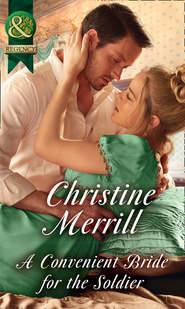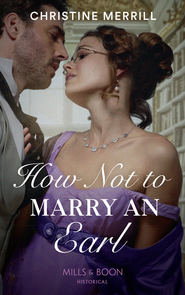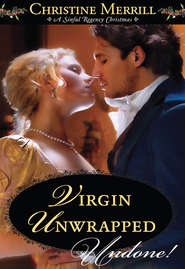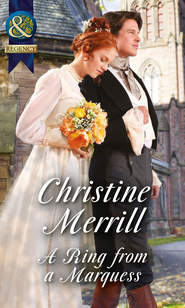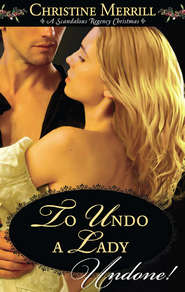По всем вопросам обращайтесь на: info@litportal.ru
(©) 2003-2024.
✖
Taken by the Wicked Rake
Автор
Год написания книги
2018
Настройки чтения
Размер шрифта
Высота строк
Поля
The camp itself was made mostly of willow bender tents. She counted six large canvas structures that looked almost as permanent as cottages, and several smaller tents, each with a cooking fire in front. There were only two or three of the wagons she had come to associate with Gypsies, and the one she had exited was by far the grandest. It was large and sturdy, and the green paint was fresh and clean. Something about it gave her the impression of power, as well as wealth. She was sure that the man who owned it was the leader of this tribe. If that was true, how much help could she expect from the people around her?
And there were many. Men sat on benches beside the fires, carving or mending shoes or pots; women bustled over the meals they were cooking; and several small children darted in and out amongst the tents, playing at tag or ball.
She went down the little wooden steps to the ground. She could feel a shifting of awareness, although few were brazen enough to stare directly back at her. To test her theory, she strode purposefully toward the edge of the camp to see how they would respond. There were ponies and carts behind some of the tents. If she borrowed one, she could find a road and leave. A road would lead her somewhere, eventually.
But before she could reach the trees, a man stepped into her path. He was shorter than Stephano, but no less intimidating. He smiled at her, showing a gold tooth, and crossed his arms over his chest. Then he took a menacing step toward her, and she scurried back into the clearing.
She could hear his laughter behind her and his call to another man, who responded with laughter of his own. She wondered had the threat been real or merely a test. If so, she had proven herself easily frightened, and for little reason.
She turned back to the camp, and looked across it at the old woman who had given her the clothing, who stood beside her fire, stirring something in a large cast-iron pot. If she had a friend here, this woman might be it. She was the only person who had shown her kindness. She stepped toward the woman’s tent and said, ‘Excuse me?’
She might not have existed, for all the attention that was returned to her.
She tried again. ‘I wished to thank you for the clothing. It was very kind of you, and I appreciate it.’
The woman looked up at her with a barely raised eyebrow. She paused for a moment, as though thinking. Then she removed a scarf from her pocket, and spread it over a nearby bench. ‘Sit.’ It was more a command than a request.
All the same, Verity said, ‘Thank you,’ as she took the seat. She wondered if the woman spoke enough English for her to be understood. Or was it only her stubbornness that made her silent? Just in case, she said, ‘This is a most unexpected turn of events. Last night, I was attending a ball at the house of my godfather. And this morning finds me in a Gypsy camp, surrounded by strangers. The man who brought me here is not friend to me, nor my family.’
She paused, hoping that the woman might supply some opinion on this, but none was forthcoming.
She continued. ‘I am afraid that he might mean me harm. He brought me here against my will. But it will not matter for long, I am sure. I am the Earl of Narborough’s daughter. My family will be looking for me, and they will be most angry with whoever has taken me, and will see that justice is done.’
She said it loud enough so that all around might hear, and left another gap in the conversation, hoping that any eavesdroppers would consider the possibility of retribution. Counting the hours since her abduction, there had been barely enough time for Uncle Robert to notice her absence and send for her brothers. But if she could keep safe for another day, or maybe two, they would find her and bring her home.
It would not even take that long, if she could persuade someone in the camp to bring them a message. ‘They will also be most grateful to whoever might help me return to them. And most generous. My family is very wealthy.’ And that should influence anyone who might be bribable.
Then she stated her greatest fear, more softly, so that only the old woman could hear. ‘I am concerned for what will happen to me, when my captor returns. I doubt that his plans for me are those of a gentleman. If you should hear any noises coming from the wagon … If I should be forced to scream for help …’
The woman turned to her and gave her another cold stare, which caused her to fall silent. Then the old Gypsy went to the fire and removed the kettle, pulled a chipped mug from the table beside the fire, filled it and handed it to Verity. She went to a basket beside the tent, cut a thick crust from a loaf of bread, and handed her that, as well.
‘Thank you,’ Verity said loudly. And then she whispered, ‘Does this mean you will help me?’
The woman said back in English, ‘It means that, if your mouth is full, you will not talk so much.’ And she walked away, returning to her tent and pulling the flap closed behind her.
Verity sat alone by the fire, chewing upon the crust of bread, waiting to see what would happen next. Whatever she had expected of a Gypsy camp, it was not what she was seeing. After the half-hearted threat when she had tried to leave, the people were showing her no interest, too caught up in the work of the day to care about a stranger in their midst. There was the regular clink, clink of someone hammering a patch onto a pot, and another man worked the bellows over a small, portable forge.
A few men worked together over a lathe, turning what appeared to be chair legs, or spindles for a banister. While they worked, they chatted in the strange language that the old woman spoke, sometimes resorting to a phrase or two of English before someone nodded in her direction and put a stop to it. Women tended fires and children, hung washing or swept debris from the floors of their tents. Everywhere she looked, people seemed busy.
All except her.
And she could not help the creeping feeling that she got on the back of her neck sometimes, that she was meant to be doing something, or being something, or going somewhere. Last night, Stephen Hebden had called her useless. She feared it was true. If the future had plans for her, she must hope that it would require nothing more taxing than watercolour drawing and excellent table manners. And playing the harp, of course.
Uncle Robert had insisted that she continue her lessons during her visit with him. As she played, the ethereal sound of the instrument made her feel even less content than before. When people heard her practice, they made what they thought were flattering comments about her angelic nature. But from the way their attention seemed to drift as they talked to her, she suspected that, while they might claim to like angels very much, the company of them was sought in moderation and tempered with that of much more earthly women.
She watched the angle of the light passing through the leaves, changing as the sun moved through the sky. And she wondered again at her location. Perhaps now that the people around her were too busy to notice, she should try again to slip away. But if she did escape, where would she go?
Home, of course. She would find someone to escort her back to London. But of late, with Father sick and everyone else grown busy with their new lives, home did not really feel like home to her.
She glanced around the camp again. But neither did this place, with its distant inhabitants and glowing sunlight. She had not slept since the Gypsy had kidnapped her, and now that she had opportunity, she was too tired to run away. Thanks to the old woman, she was neither as hungry nor as cold as she had been. Perhaps, after a nap, she would be better able to think of a way out of this dilemma. She closed her eyes and let her head loll.
Chapter Four
It took longer than expected for Stephano to return to camp that night. He was not used to the new location, after the recent move. His family had chosen wisely, for the spot was so subtle and well disguised that he had needed to stop and observe the patrin that had been left to mark the way. A broken twig here, a torn leaf there, a bundle of flowers tied to a branch. All served as indicators that he must go left or right through the trees to find the camp again, on ways so small it was almost as great a challenge to ride his horse as it had been to steer the gig when he had taken Verity Carlow.
It told him something of her cleverness, that his captive had turned his momentary confusion on the previous night into an escape attempt. If she was as sharp today, he would be hard-pressed to keep track of her. The trip to London and back had left him dull witted. His head hurt, and the cut on his hand pained him more than it should.
They must be growing near, for his big black stallion, Zor, pricked up his ears, and fought to set his own pace. It was not worth struggling for control, so he gave the beast its head, and in no time, the journey was done.
As he fed and groomed his horse, from every corner of the camp he heard cries of ‘Stephano! Sastimos, Stephano!’ And felt an answering surge of joy at the warmth of their greetings. Children crowded around him, begging for the bag of sweets they knew he would bring. The sun was dropping towards the horizon, and he could smell the evening meals cooking on the fires inside the circle of tents. The women shouted warnings to their offspring about ruined suppers and gave him half-hearted scolds about sweets before a meal. But they smiled as they did it, and he knew that there would be a plate of food waiting for him at any campfire he chose.
For a moment, the warmth and friendship overcame the headache which was rising again as he prepared for the angry confrontation that awaited him on the other side of his vardo door. By now, Verity Carlow would be hungry, as well as cold. And since it was unlikely that she had missed a meal in twenty-one years, she would be overcome by the hardship. Her temper would be somewhere between merely foul and completely hysterical. And he would be forced to bear the brunt of it, without response. He had promised Keddinton that he would not hurt her, nor did he wish to.
But life would be much easier if he gave over the last of his scruples and settled violence with violence. To follow the way of his mother’s curse, guided by fate and the pain in his head, made life far too complicated. If he wished revenge against any of the Carlow men, it would have been so much easier to catch them unawares and knife them in the ribs. Or meet them on the field of honour, as his father would have wanted. He was proficient with a variety of weapons, and sure of success because right was on his side.
And as for the girl?
Her golden brown hair was the colour of wild honey, and she had skin like fresh milk. It made him hungry, in so many ways, to think of her. And the look in her huge eyes when they’d danced had been a mixture of innocence and curiosity, just as the colour of them had blended green and brown. Although she had been by far the most cautious member of her family, he had seen the way she’d looked at him, last night in the vardo. She would put up a token resistance to his advances, before offering her maidenhead. And when he’d had his fill of milk and honey, he could have laughed at her disgrace and sent her home to break her father’s heart.
As his own father had done to his mother. The thought set his head to hammering again. He suspected that the spirit of his mother would have more sympathy for the girl than she would for her own son, and would make him suffer greatly should he abuse her.
If only to save himself a headache, he would treat Verity Carlow with respect, if not with kindness. She could have her ragged dress back and a bowl of stew for supper. And she would sleep alone in his bed, which was the softest in the camp. He would turn a deaf ear to her complaints. In a week or less, her father would be begging to get her back, and Stephano would be glad to be rid of her.
He glanced over at his grandmother’s tent, and at the trim Romany girl that sat on the bench beside it. Soon he would settle the Beshaley curse. And if he survived the experience, he would spend his evenings by the fire in camp, flirting with a pretty girl like that. He would have a happy wife, and a vardo full of children.
And then, the last rays of sun touched the honey-blond hair of the girl by the fire. His anger at his own mistake made his head ring with pain as sharp and clear as ever he’d felt. He handed the last of the candy from his pocket to the nearest child, and stalked across the camp to confront his escaped prisoner. ‘What are you doing, out of the wagon?’
‘I’m sorry?’ Lady Verity Carlow gave him a frigid smile. ‘Did you mean for me to remain there? You did not say.’
‘I thought the message was clear enough.’
‘I assumed that you had come to your senses, and sent the old lady to feed and clothe me, as an apology.’ She lifted her chin and gathered her dignity. With a little toss of her head, she made the borrowed dress look like the height of London fashion. ‘Unless she came to me without your permission. Perhaps your followers are not as obedient as you think.’
Which was true enough, if they were talking of his grandmother. ‘Magda!’ He bellowed her name, and the old crone came out of her tent—slowly, to show him that his desire for her immediate presence was not likely to hurry her steps.
She glanced up at him in mock surprise and said in Romany. ‘You have returned, grandson?’
He answered her in the same language, knowing she would only pretend ignorance if he talked English for the benefit of his prisoner. ‘Old woman, who let the girl out of my vardo?’
‘I did, of course. She was squalling like a baby goat.’ She turned to the girl and made a rude, bleating noise that made Verity jump back in alarm. ‘I looked in through the window and saw that you had left her bare. And with not a thing to eat. You had given no word when you might return. Did you mean to starve her?’
‘I was not gone a day, as you can see. Missing a meal would do her no harm.’
Magda shrugged. ‘How was I to know? So I gave her some clothes so that she would not shame herself, and brought her out to feed her. What do you mean, bringing this gadji into the camp to sleep in my wagon?’
‘I built the wagon for you. I use it because you refuse to sleep there.’
Magda made a face. ‘The soft bed hurts my back. And a true Rom does not need such luxury. To sleep on the ground as Devla intended—’






